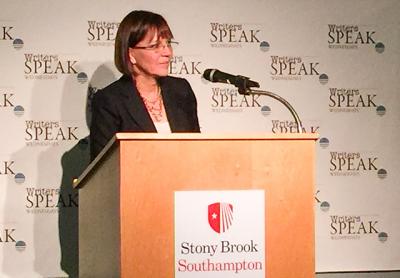Miller’s Time: On the Media and Mar-a-Lago

Judith Miller has made a career out of tracking dictators and their attempts to amass weapons of mass destruction. Last week she had words of warning for a crowd gathered at Stony Brook Southampton for a reading: “I have never seen a time of such peril for this country.”
She was referring to the Trump administration’s tough stand on North Korea, and “playing games with this country” that “already has four, five, up to 10 — we don’t really know — nuclear weapons . . . headed by a crazy man who only talks to basketball stars. We’re in a whole new territory. We’re going to need good reporting now more than ever.”
Currently a Fox News contributor, the former reporter for The New York Times and Sag Harbor resident said she almost did not make it out from the city to Shinnecock Hills for the reading because of the latest breaking news from the White House. “Donald Trump just reversed himself on NATO. Remember he called it useless? Today it’s just great, now that they’re spending money on terrorism.”
She added a historical note: NATO’s first involvement with terrorism was in 2001, when it helped the United States go after Osama bin Laden after the Sept. 11 terrorist attacks.
“We’ve had a complete flip-flop, and now we’ll spend barrels of ink and have many commentators telling you how this change came about.” Having interviewed the president at Mar-a-Lago, his Palm Beach mansion, she said, “nothing he says or does at this point would surprise me.”
It has been more than a decade since Ms. Miller’s articles for The Times corroborated the Bush administration’s incorrect claims about Saddam Hussein’s arsenal of weapons of mass destruction in the run-up to the Iraq War. And it has been two years since the publication of her book that attempted to explain her reporting. But for several members of the audience, their resentment of what they saw as her role in legitimizing the conflict was still raw.
Ms. Miller read two passages from “The Story,” her 2015 book about her life before and after the period of reporting that earned her infamy and also jail time for refusing to reveal one of her sources, who turned out to be Scooter Libby, the chief of staff of then-Vice President Dick Cheney.
It was in the question-and-answer session when the room started to heat up. The first question — “By what measure does your front-page reporting on weapons of mass destruction not constitute fake news?” — set the tone for many of those that followed.
She did not shy away from the questions or the questioners, who, in some cases, were personal in their attacks.
“The book was an effort to examine what I got wrong,” she said. “Much to my surprise, the stories that I and The Times were criticized for were not wrong. When I said President Bush was told X, Y, and Z, he was told X, Y, and Z. The problem was what he was told was wrong.”
She added that classified information, by its very nature, is challenging to verify independently. As a reporter, she had to rely on sources who could only describe to her what they had seen. “You cannot see the raw material; you cannot see the people who are providing the information for the intelligence reports. You are often going to make mistakes,” she said. “So what is important is letting people know when we did.”
Ms. Miller said she vetted what her sources told her by going abroad to talk to officials in countries like England, France, Germany, Israel, and Jordan, nations either skeptical of the U.S. reports or neighbors of Iraq who knew what Saddam Hussein was capable of and had seen the results of his earlier uses of similar weapons.
“When all of them said absolutely, he has it, he’s hiding it, and he’s a terrible man anyway, I tended to believe them, because I did the best I could to balance whatever their political bias was with the bias of our leaders,” she said. “That’s pretty much all you can ask a journalist to do.”
She was concerned about the media’s polarization, now energized by its opposition and resistance to Donald Trump. “We pay a price for a polarized press. Yes, we can have a standard of fair and objective reporting, saying, ‘on the one hand’ and ‘on the other hand.’ That’s so boring, isn’t it? You get through 15 arguments and you’re so tired. But I think that’s still the goal to which journalism should aspire.”
She found it depressing, she said, that journalists can tweet “atrocious things about a president that if they said in print would get them fired, but it’s okay because it’s on their Twitter feed.”
But what is most important, she said, is for journalists to pursue the questions swirling around the election and the current administration: “What are the connections — if there are any — between Russia and the hacking of the [Democratic National Committee], the attempt and success of interfering with our election process? Who knew what, when, where? Who’s making policy in this administration?”
Ultimately, Ms. Miller said, “There’s so many questions to be asked and so much reporting to be done that to start beating up on the media because things are not being done as well as they should be done is missing the point.”
